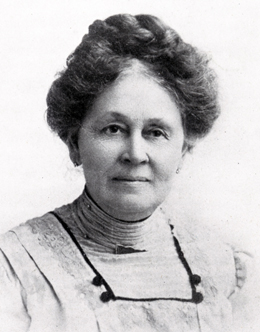On June 30, 1909, the Washington Equal Suffrage Association holds its convention at Plymouth Congregational Church in downtown Seattle. During the course of its proceedings, hostilities between the organization's president, Emma Smith DeVoe (1848-1927), and a contingent of suffragists from Eastern Washington led by the organization's vice-president, May Arkwright Hutton (1860-1915), come to a head. Word of the conflict reaches local newspapers and is reported widely, embarrassing Washington suffragists and national suffrage leaders who are about to launch the 41st Annual Convention of the National American Woman Suffrage Association Convention, designed to take place during Washington's first world's fair, the Alaska-Yukon-Pacific Exposition (A-Y-P), held on the University of Washington campus.
Of the 250 conference attendees, 100 were not credentialed delegates. The conflict, which had its roots in the very different styles of the ladylike DeVoe and that of Hutton, whose brash style suggested the prototype of Wild West strike-it-rich success, revolved around the question of whether 23 local suffrage clubs organized by Hutton would have their dues accepted and be allowed to join the Washington Equal Suffrage Association.
Conflicting Styles
In early 1909 Hutton and Devoe had clashed during the legislative session in Olympia, primarily over how quickly and forcefully the suffrage lobbyists should push legislators to pass a woman suffrage amendment by February, in order that it could be submitted to the voters for ratification in the November 1910 general election. DeVoe, infuriated, faulted Hutton for her aggressiveness and cast aspersions on her morality.
Not just Hutton, but several younger Seattle suffragists felt that Devoe had too much power and sought a more equitable distribution of decision-making within the organization. DeVoe received a monthly salary from the National American Woman Suffrage Association as compensation for her organizing efforts in Washington. The national organization saw success in Washington as key to an eventual national suffrage amendment.
Bad Publicity
The conflict was especially ill-timed since both state and national suffragists planned public appearances, lectures, and sought high visibility and positive exposure to the throngs of people attending the Alaska-Yukon-Pacific Exposition ongoing during the summer of 1909 on the University of Washington campus in Seattle.
Washington suffragists used the so-called "still hunt" strategy of gaining public support for the suffrage amendment through a calm, reasoned, direct appeal to Washington male voters and their female family members. Suffragists appeared at local fairs and gatherings, spoke personally to the electorate, formed suffrage clubs to work within communities across the state, and distributed suffrage literature. They eschewed publicity such as that which resulted from the more militant methods of British suffragettes, whose frequent arrests, public demonstrations, and prison hunger strikes kept them on the front pages of newspapers around the world. The publicized conflict during the Washington Equal Suffrage Association convention did not begin to approach the actions of the British suffragettes, but it cast a pall over the suffragists' efforts and exposed them to public ridicule.
Skeleton in the Suffrage Closet
The Washington suffragists did not speak directly to the press about the conflict. This may have been an attempt to smooth things over, but it resulted in wild speculation and conjecture among local reporters and probably kept the contretemps in the public eye rather than allowing it to fade. "May Hutton After Em Devoe's Scalp -- Spokane Bevy of Woman Suffragists Means War To The Knife" ran one headline in The Spokesman Review. The Seattle Star, always quick to report a scandal, ran stories headlined "Women Shake Bones of Suffrage Skeleton," "Suffragists Bolt And Merry War Is Growing," and "'Outs' Score Point and Mrs. DeVoe and Friends Are Peeved."
Progress, the monthly publication of the National American Woman Suffrage Association, recounted tartly:
"The Convention of the Washington E.S.A. was held June 30, and a contest for representation by the Spokane branch engaged the newspaper space to the exclusion of any other news of the meeting. Following this cue the papers continued to exploit the contest as the chief feature of their Convention reports. Reading these stories one almost would be led to suppose that the only business of the National Convention was to deal with the Washington difficulty" (August 1909).
The executive board of the National American Woman Suffrage Association heard from both the Hutton and Devoe contingents as one of their first orders of business on the morning of July 1, 1909. On the morning of July 2, 1909, the question of which, if either, contingent should be seated at the NAWSA convention was put to a vote of all the delegates, who returned the verdict that both groups could attend but neither could vote -- a neutral position that somewhat mollified the press and allowed public focus to return to the push for suffrage rather than fractious infighting.
Devoe was stripped of her salary later in the week and the Eastern Washington contingent formed a splinter organization, the Washington State Suffrage Worker's Association.

